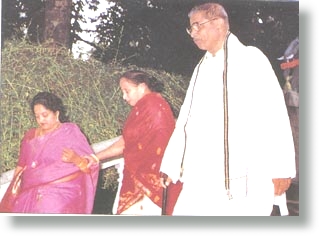Dadaji's
mind was carefully cultivated by his father Shri Vaijnathji, who in turn was
shaped by his father Laxman Rao. In fact, everyone in the Athavale family
had shown a preference for righteousness over riches, service over selfishness.
The ever manifested energy & brilliance in their activity, no wonder that
Rev. Pandurang Shastri popularly known as Rev. Dadaji born in such family
was adored world over.

THE DYNAMIC TRADITION OF GREAT ANCESTORS
It is said that there is no point in tracking the source of river &
the ancestry of a 'Rishi' the visionary; as these may be insignificant. But
it is also true, that a common man may find source of inspiration in the ancestry
of a sage, however insignificant it may be. It also satisfies the inquisitiveness
& enables him to interpret the sage's life in a better way. In this we
notice the prudence of the omnipotent God & the way He works.
It is great wonder as to how a powerful thought, the pure devotion to
God and spiritual philosophy get manifested in one single individual! How
is it that a person, the very embodiment of purity and penance could be born
only in the family of Athavales' of pen, in this 20th century? God's realm
has it's own laws, the coming up of Pandurang among the Athavales' can be
explained in the light of sacred linage of God centered ancestors.
The great-grand father of Rev.Pandurang Shastriji bore the same name 'Pandurang'.
He was a God centered holy & truthful. His son Parshuram Panth led his
life honestly as a stamp vendor. He added glory to his father in personal
behavior. He once stood a surety for someone. This resulted in the total sacrifice
of his personal possessions. He stuck to his promise till he breath the last.
Rev. Pandurang Shastri's grandfather Laxman Rao use to go to the colony
of harijans, who were treated as untouchables, to teach 'Manache Shlok'(a
sacred text in Marathi). This incident naturally brings out the memories of
the devotional saint, Narsinh Mehta. Dynamic ancestors, exhibited courage
of visiting the residence of harijans while their offspring Pandurang Shastri-
Rev. Dadaji took harijans closer to him self & lovingly mixed them in
swadhyay family. How can we describe the lustrous person Pandurang who gave
concrete shape to his thought. 'Bhakti (devotion) is a social force'; a religious
reformer or a revolutionary philosopher.

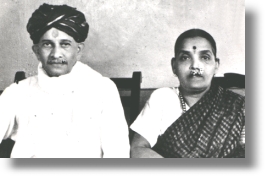
EDUCATION:
ACCORDING TO ANCIENT TAPOVAN SYSTEM OF INDIA
Dadaji's father, Rev. Vaijnathji Athalvale who was a man of principles,
was well aware as to what type of Education be given to his son, Pandurang
who had extra ordinary power of grasping the subject. After Pandurang completed
his school education in Mumbai, his father, who was farsighted introduced
Pandurang to system of education according to Tapovan as was practiced in
ancient India, at Roha. This was done against the wishes of other relatives
who were of the opinion that Pandurang must go for attractive & lucrative
ICS examination. But Rev. Vaijnath Shastriji wanted him to be a true Brahmin
who lives for the sake of culture. Therefore, Rev. Vaijnath Shastriji opened
a unique center called by the name 'Saraswati Sansktrut Pathshala' & gave
education to his son in that school. A thoughtful and principled society would
emerge, only when there is a synthesis of Indian cultural heritage & contemporary
western thought. In the Tapovan of Roha students were given deep training
in comparitive eastern and western philosophies along with proficiency in
English language. The traditional belief that English learning is banned in
hermitage-tapovan type of education was given good bye. The students of the
Tapovan no longer remain narrow minded, bookist scholar. All this was due
to the foresight and vision of Rev. Vaijnathji the father of Rev. Pandurang
Shastri.

THE
BEGINNING OF HIS 'KARMAYOGA' - LIFE MISSION
The year 1942, was a memorable year in the history of independence struggle
of India. The entire nation was in turmoil due to the sense of insecurity.
Mumbai became depilated. That was a turning point in the life of Rev. Dadaji,
his father, Rev. Vaijnathji who was busy with his Swadhyaya activity, morning
and evening for last sixteen years. Due to throat trouble his voice got chocked
up, therefore the responsibility of conducting Swadhyaya and delivering discourses
fell on shoulders of his son Pandurang, who was only twenty two year old.
He commenced his Swadhyaya with the discourses on Karikas of Gaud Pada on
Mandukya Upanishad.
The Vyaspeeth (Seat of teaching) in the Bhagwad Geeta Pathshala (from
where Rev Dadaji has been delivering his discourses) is really a life inspiring
thought centre. For, it fills the lives of listeners with sweetness by instilling
in their lives qualities of equality, self awareness, devotion and energy.
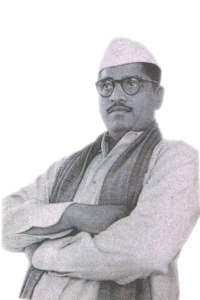


THE
VOW OF NON DEMANDING
The roots of the great tree of Swadhyay process are nurtured by the pure
and divine waters of non demanding attitudes. This attitude traces back to
the ancestors of Rev. Pandurang Shastri. Rev. Vaijnath Shastriji was firm
on the vow of non-demanding inspite of the difficult times.
The attitude of non demanding is in the very blood of Rev. Dadaji. Today
Swadhyaya work has grown enormously but in the early days, Rev. Dadaji had
to face lot of difficulties and tests. Rev. Dadaji faced a number of obstacles
and difficulties while stabilizing and progressing thoughts of Swadhyaya,
but he never compromised his dedications to principles. He never surrendered
before the circumstances. He boldly took the challenges, faced them fearlessly
and conquered them.
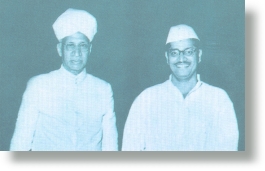
During
the inaugural ceremony of Tatvajnan Vidyapeeth (University, Rev Dadaji instituted
to impart the kind of education he received, to modern day youth) in 1958 Dr.
S. Radhakrishnan, then Vice-President of India, told Rev Dadaji 'how can You
run an institute without demanding and accepting donations! There is no such
incidence in history so far known. There is nothing wrong in making an appeal
to people for the sake of religion and culture. Society is good and noble, one
has to go to the society & demand from it . How will the society know your
mission, if you don't approach it.'
The very meaning and substance of Dadaji's non demanding attitude is allowing
money or means from a person if is thoroughly convinced by the thought moreover
Rev. Dadaji refuses several times so that the urge in a person to offer for
God is tested. People feel the sense of gratitude by coming to Swadhyaya and
offering for Swadhyaya. They feel lucky if they become instrumental in serving
God through Swadhyaya.
'Everyone
needs money for carrying out any social work, while establishing the Banaras
Hindu University, I also did approached society'. Rev. Dadaji replied 'I have
firm faith in God that my work has God's approval, god will take care of my
work and he'll run it, provided my faith and devotion for him is absolute. Perhaps
for you, society is absolute but for me God is absolute and society is instrumental'.
REV.DADAJI'S
LIFEWORK :
To understand issues of human dignity and equality across diverse cultures
and traditions, Rev, Dadaji has read extensively. This self-education in world
cultural and religious history has led him to understand the essential of
social dialectics and liberal rationalism, but he has also rejected their
materialistic exclusivity. He does not demonize liberalism, Marxism or any
other ism. He has a disarming ability to disagree without being disagreeable
and to set forth his views without being contentious.
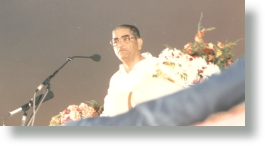
As a participant in Second World Religions Congress in Japan in 1954,
rejecting both unbridled materialism and fatalism, he stressed the salience
of the Vedic way of life for creating integrated personality, a universal
man. He spoke of the relevance of the Bhagwad Gita (Gita in short) in resolving
the predictament of modern man and solving the problems of material life.,
both at individual and social levels. He proposed an alternative vision, based
on self-less love, dignity accorded to all , and co- sharing of community,
well and weaving in to a unified approach to life. But he had no answer when
he was asked weather there was any village or community in India which lived
by these ideals . He took it as a challenge and decided to work out his ideas
at home instead of becoming an academician or a roving philosopher in the
West, as Arthur Holly Compton, A Nobel laureate physicist from America wanted
him to do.

On his return to India, Rev Dadaji Continued delivering discourses at
Shrimad Bhagvad Gita Pathshala. Beginning in the mid-fiftees, an increasing
number of young professional such as solicitors, accountants, physicians,
engineers, teachers etc in Mumbai area were attracted by Rev. Dadaji's ideas.
Like others they were skeptics because their idealism was not reflected in
the world outside. They found old formulations useless and were keen to know
where to find new understandings of relationship between God and man without
abandoning their inherited traditions . Rev. Dadaji clearly showed them that
the philosophical ideas of Vedanta are magnificent in conception but beyond
capacity of most individuals who attempt to live by such percepts. His first
task was to enable people to raise their capacities to meet these goals.
He picked nineteen of the young men among his early listners and had lengthy
and intense discussions with them at Mumbai's sea beach for a period of more
than two years. These young men, and whoever has come in contact with Rev.
Dadaji, have been attracted by a certain loftiness and integrity of his character,
his learning , his infectious optimism and his self-less love for others.
Rev Dadaji inspired city-based professionals to go to the villages of Saurashtra
region of Gujarat for a fortnight on Bhaktipheri (devotional tours or visits),
with an intention to make the villagers aware of human brotherhood and to
shake them off their cynism which had crept in everywhere. Eventually bhaktipheri
was to serve as key to mobilizational activities of Swadhyay. Though initially
cynical, this city-bred young professionals went to Saurasthra (north Gujarat).The
original trickle became a stream in sort time.

PHILOSOPHER
AS A FAMILY MAN :
Himself a married man and a householder Rev. Dadaji, believes that home
Is the true hermitage of a man. By dutifully performing the obligations of
a house holder the individual becomes heroic. How can words describe such
unique person who has good fortune of becoming the life partner of Rev. Dadaji
an epoch making personality. Ideals of womanhood are reflected in Rev. Tai's
personality. Rev. Tai: every word she utters is filled with love and overflowing
affections leads one to enrichment. Adarniya Didi , the fragrance of the garden
of of Rev. Dadaji's and Rev. Tai's married life is a moving spirit, inspiration
and zest of Swadhyaya Pariwar. She is synthesis of head and heart.
Shes is endowed with unbound beauty of character, emotions and intellect.
But Rev. Dada's family starts from here but includes millions of Swadhyayees
and heartily invites whole world to be part of it.







